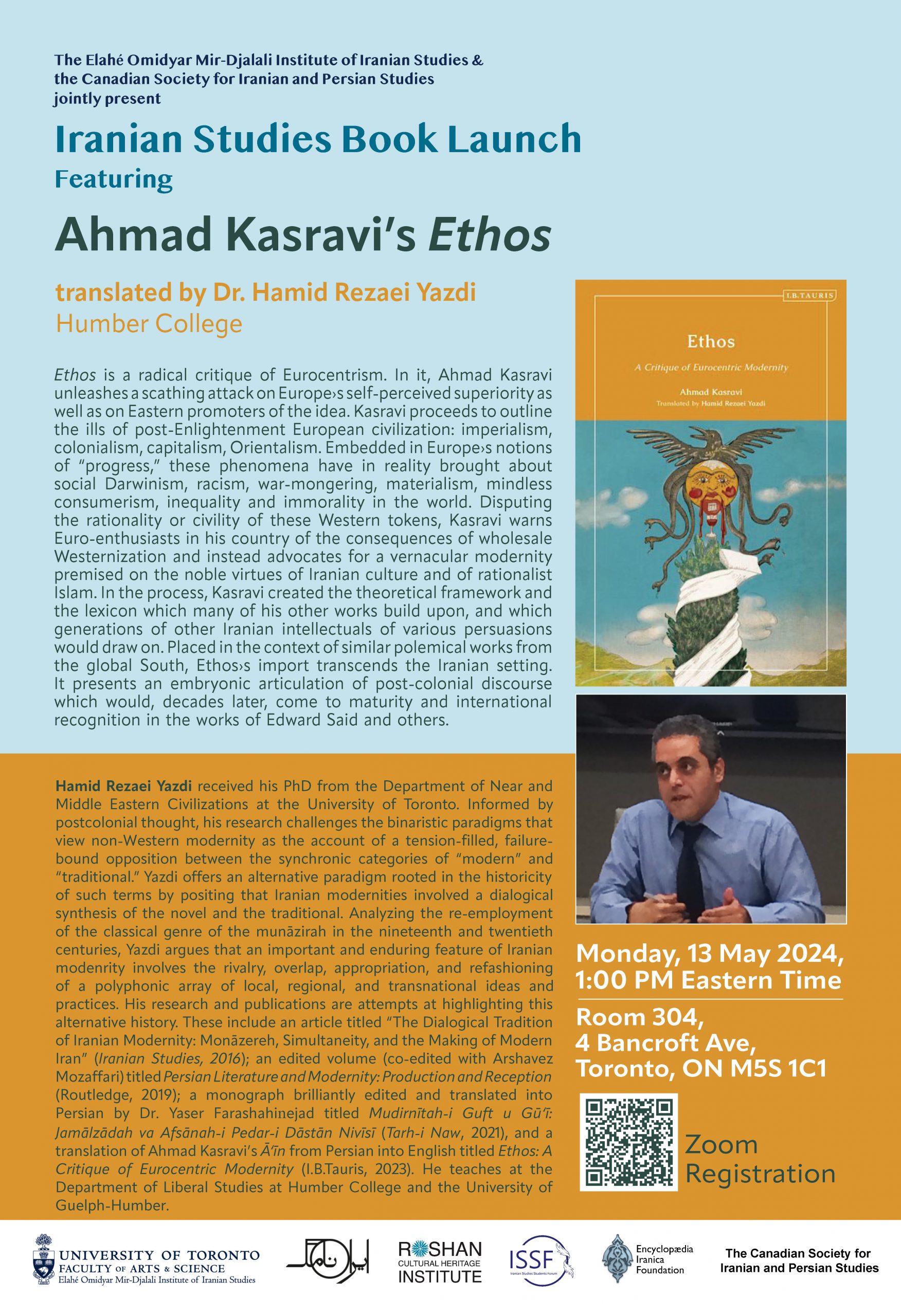

The Elahé Omidyar Mir-Djalali Institute of Iranian Studies
and the Canadian Society of Iranian and Persian Studies
jointly present:
Ahmad Kasravi’s Ethos: A Critique of Eurocentric Modernity
translated by Dr. Hamid Rezaei Yazdi (Humber College)
Monday, May 13, 2024 1 pm Eastern Time (Canada & US)
Rm 200B, 4 Bancroft Ave, Toronto, ON M5S 1C1
Zoom Meeting Registration:
https://utoronto.zoom.us/meeting/register/tZ0vdeqqqzwrGNAp980KyK0NKLoiOtfgZpfl
After registering, you will receive a confirmation email containing information about joining the meeting.
Ethos is a radical critique of Eurocentrism. In it, Ahmad Kasravi unleashes a scathing attack on Europe›s self-perceived superiority as well as on Eastern promoters of the idea. Kasravi proceeds to outline the ills of post-Enlightenment European civilization: imperialism, colonialism, capitalism, Orientalism. Embedded in Europe’s notions of “progress,” these phenomena have in reality brought about social Darwinism, racism, war-mongering, materialism, mindless consumerism, inequality and immorality in the world. Disputing the rationality or civility of these Western tokens, Kasravi warns Euro-enthusiasts in his country of the consequences of wholesale Westernization and instead advocates for a vernacular modernity premised on the noble virtues of Iranian culture and of rationalist Islam. In the process, Kasravi created the theoretical framework and the lexicon which many of his other works build upon, and which generations of other Iranian intellectuals of various persuasions would draw on. Placed in the context of similar polemical works from the global South, Ethos›s import transcends the Iranian setting. It presents an embryonic articulation of post-colonial discourse which would, decades later, come to maturity and international recognition in the works of Edward Said and others.
Hamid Rezaei Yazdi received his PhD from the Department of Near and Middle Eastern Civilizations at the University of Toronto. Informed by postcolonial thought, his research challenges the binaristic paradigms that view non-Western modernity as the account of a tension-filled, failure-bound opposition between the synchronic categories of “modern” and “traditional.” Yazdi offers an alternative paradigm rooted in the historicity of such terms by positing that Iranian modernities involved a dialogical synthesis of the novel and the traditional. Analyzing the re-employment of the classical genre of the munāzirah in the nineteenth and twentieth centuries, Yazdi argues that an important and enduring feature of Iranian modenrity involves the rivalry, overlap, appropriation, and refashioning of a polyphonic array of local, regional, and transnational ideas and practices. His research and publications are attempts at highlighting this alternative history. These include an article titled “The Dialogical Tradition of Iranian Modernity: Monāzereh, Simultaneity, and the Making of Modern Iran” (Iranian Studies, 2016); an edited volume (co-edited with Arshavez Mozaffari) titled Persian Literature and Modernity: Production and Reception (Routledge, 2019); a monograph brilliantly edited and translated into Persian by Dr. Yaser Farashahinejad titled Mudirnītah-i Guft u Gū‘ī: Jamālzādah va Afsānah-i Pedar-i Dāstān Nivīsī (Tarh-i Naw, 2021), and a translation of Ahmad Kasravi’s Ā‘īn from Persian into English titled Ethos: A Critique of Eurocentric Modernity (I.B.Tauris, 2023). He teaches at the Department of Liberal Studies at Humber College and the University of Guelph-Humber.